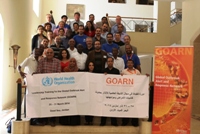 Established in April 2000, the GOARN is a network of WHO comprising institutions and health agencies that have the capacity to contribute technical resources for international outbreak response operations.Between 25 to 31 March 2014, the WHO Regional Office hosted its first pre-deployment course on international outbreak response for the Eastern Mediterranean Region's partner institutions of WHO’s Global Outbreak Alert and Response Network (GOARN) at the Dead Sea in Jordan. A total of 24 participants, selected mostly from health institutions and ministries of health of the Eastern Mediterranean Region attended this pre-deployment course.
Established in April 2000, the GOARN is a network of WHO comprising institutions and health agencies that have the capacity to contribute technical resources for international outbreak response operations.Between 25 to 31 March 2014, the WHO Regional Office hosted its first pre-deployment course on international outbreak response for the Eastern Mediterranean Region's partner institutions of WHO’s Global Outbreak Alert and Response Network (GOARN) at the Dead Sea in Jordan. A total of 24 participants, selected mostly from health institutions and ministries of health of the Eastern Mediterranean Region attended this pre-deployment course.
The training course aimed at developing a network of technical institutions and agencies in the WHO Eastern Mediterranean Region, ready for rapid deployment, in the event of any outbreaks in the Region that necessitates an international response.
Countries of the WHO Eastern Mediterranean Region are frequented by outbreaks from emerging infectious diseases. The emergence of Middle East Respiratory Syndrome (MERS-CoV) and re-emergence of yellow fever, Rift Valley fever, dengue fever, Crimean–Congo hemorrhagic fever and cholera in the recent past in the Region exemplify that outbreaks are not predictable and do happen unexpectedly.
The only way to minimize their health impacts is to early detect these outbreaks and respond rapidly and effectively. As organizing this training course was a part of the Regional Office’s efforts to establish the regional arm of GOARN, it is expected that the completion of this pre-deployment course will help the Regional Office to leverage a network of technical institutions in the Region who can offer multi-displinary experts for rapid field deployment in the event of any outbreak that requires international response. The creation of this network will also enable the Regional Office to fulfil its alert and response responsibilities effectively through establishing a mechanism for rapid deployment. Certificates were also distributed to the successful candidates who went through a scenario-based simulation exercise intended to build team leadership and coordination skills for outbreak response operations in the field.
Further reading
Read more about the Global Outbreak Alert and Response Network




